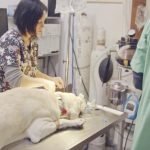Dr. Greenway discusses how to prevent obesity in dogs and cats and why it’s so important to ensure our pets are not overweight. Other topics covered in this video include body condition score, obesity, diabetes, arthritis, heart disease, anxiety, weight loss, weight management tool, low calorie diets, weight loss, body appearance, exercise and quality of life.
TRANSCRIPT:
I’m Dr. Clayton Greenway with healthcareforpets.com. What I wanted to talk a little bit about was obesity. I think this is a huge problem in our pets, in fact, they say that 50 percent of pets are overweight, I actually think it’s more than that and I believe that’s the case for two reasons. The first is that a lot of food out there is very rich, it’s very high calorie. You can imagine if your dog walks up to a bowl of food, sniffs it and walks away, are you ever going to buy that food again? So I think there’s a lot of food companies that make the food very rich and very enticing for pets and you really want to take a look at the number of calories and talk to your vet about how many calories your dog should have. The other reason why pets are overweight quite frankly is love. It’s because we love them a little too much and let’s face it everybody loves to feed a pet so when you have friends over, kids, things like that they all want to feed your pet. People really get wrapped up with feeding them something terrific like a piece of meat or a piece of cheese. We do this because we love them, we think it tastes great but the bottom line is is your pet just really likes receiving a treat from your hand so good treats to give them are things like raw vegetables, broccoli, cauliflower, carrots that are cut up, things like this that have very little calorie and it still gives them that attention.
It’s very important that you don’t let your pet get overweight because it leads to all sorts of problems and very expensive problems as well. It can lead to arthritis, heart disease, diabetes, and quite frankly it really bothers me to be treating all of these pets for these things when it’s actually really easy to control but I know it’s difficult to control emotionally.
The other thing I notice is people have a really difficult time getting weight off of their pets. A lot of people think if they just exercise them more that will help. It’s very important to realize that 90 percent of getting weight off your pet is really about diet control and the food. The exercise plays a very tiny role in that so what I want you to do is I want you to take a look at your pet and look at our weight management tool. On there you’ll see videos and charts that show you pets of different weight categories, their body condition score and you can find your pet in there and if the body condition score is four or five, then we want to get that body condition score back down to three. So take a look there and what will also be there is a calculator where you can punch in the number of calories that you find on the bag of food that you’re feeding and we will show you exactly how much to feed of that food to get them to the ideal body weight. I cannot stress enough how important that is going forward. Let’s take an example, so for a large breed dog, if they become overweight they can easily develop arthritis. In fact, I’ve seen some dogs that would have never developed arthritis at all if they were an ideal weight and now how much can it cost to treat arthritis in a large breed dog that’s overweight? It can easily cost $100 or $150 dollars a month for the rest of that dog’s life whereas if it was an ideal weight, you would have never had that cost at all. To find out more about arthritis, you can go to our page and video about that as well.
Weight is a huge problem in our pets and I really want you to work hard at keeping your pet an ideal weight because what’s most important to us is your pet’s health here at healthcareforpets.com.








